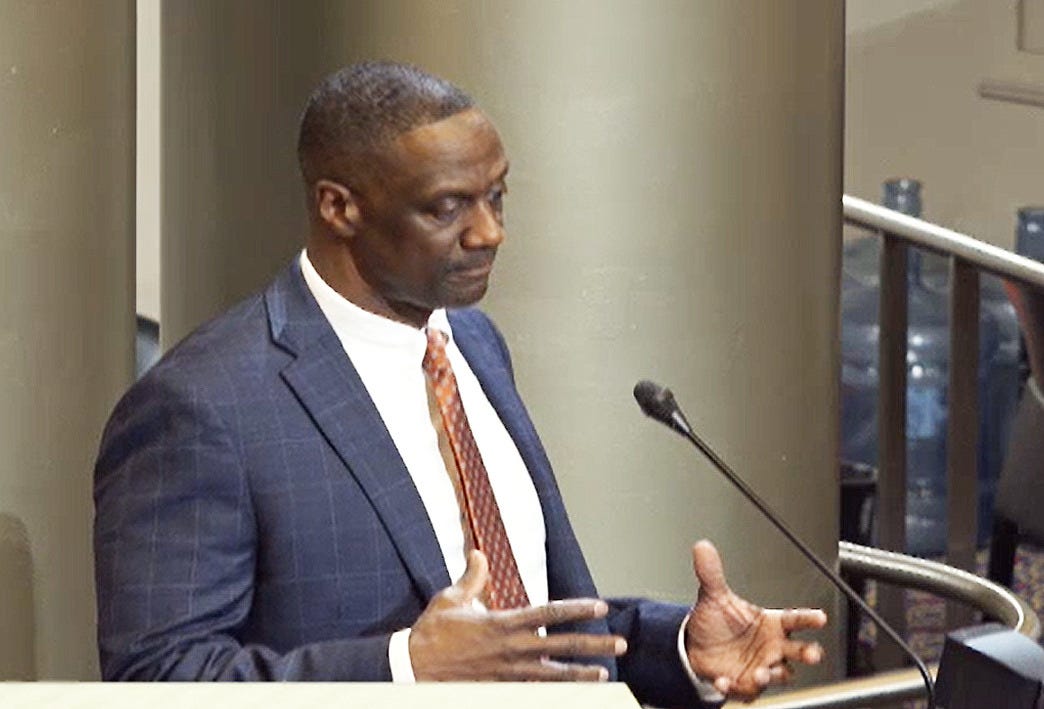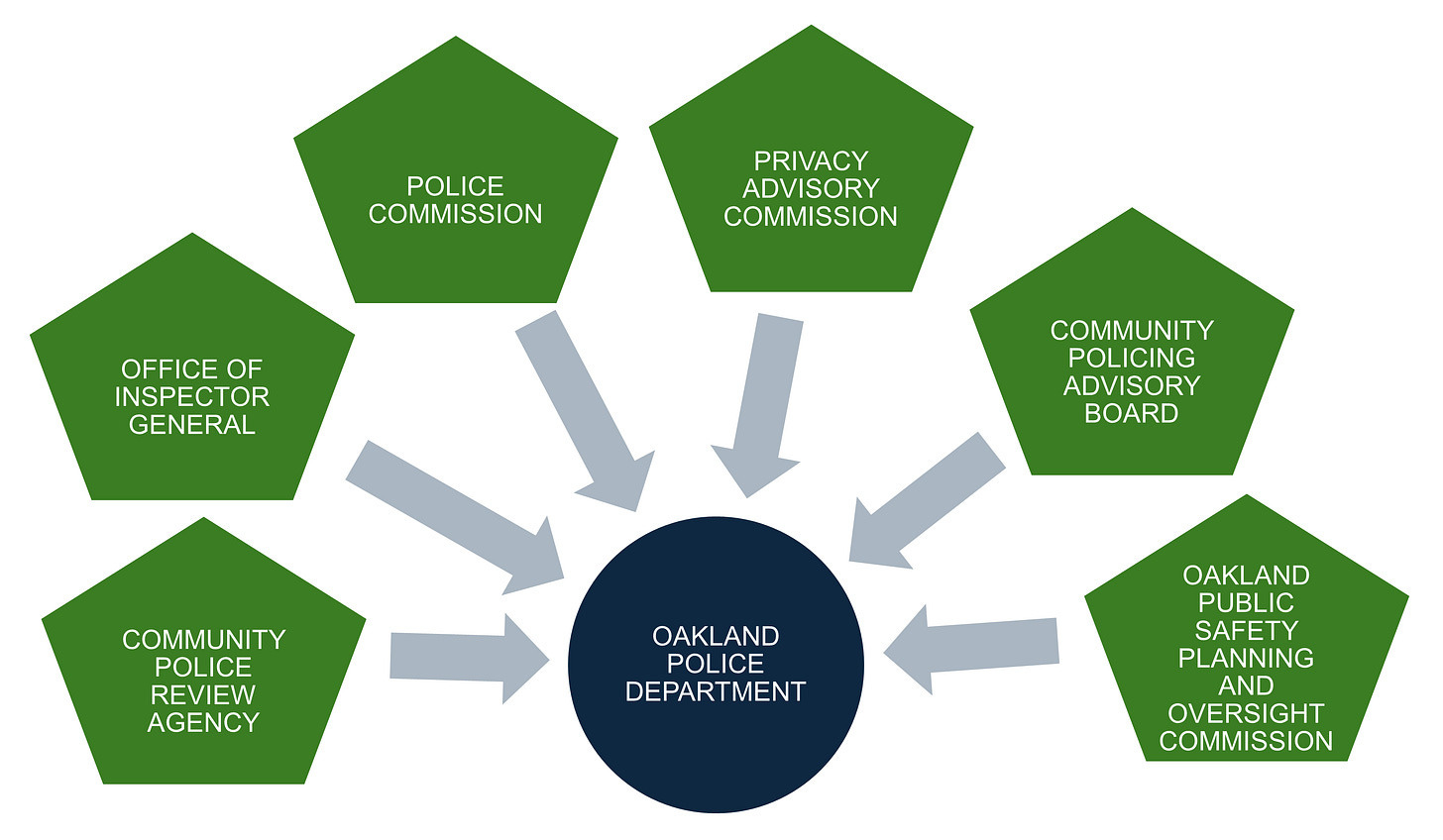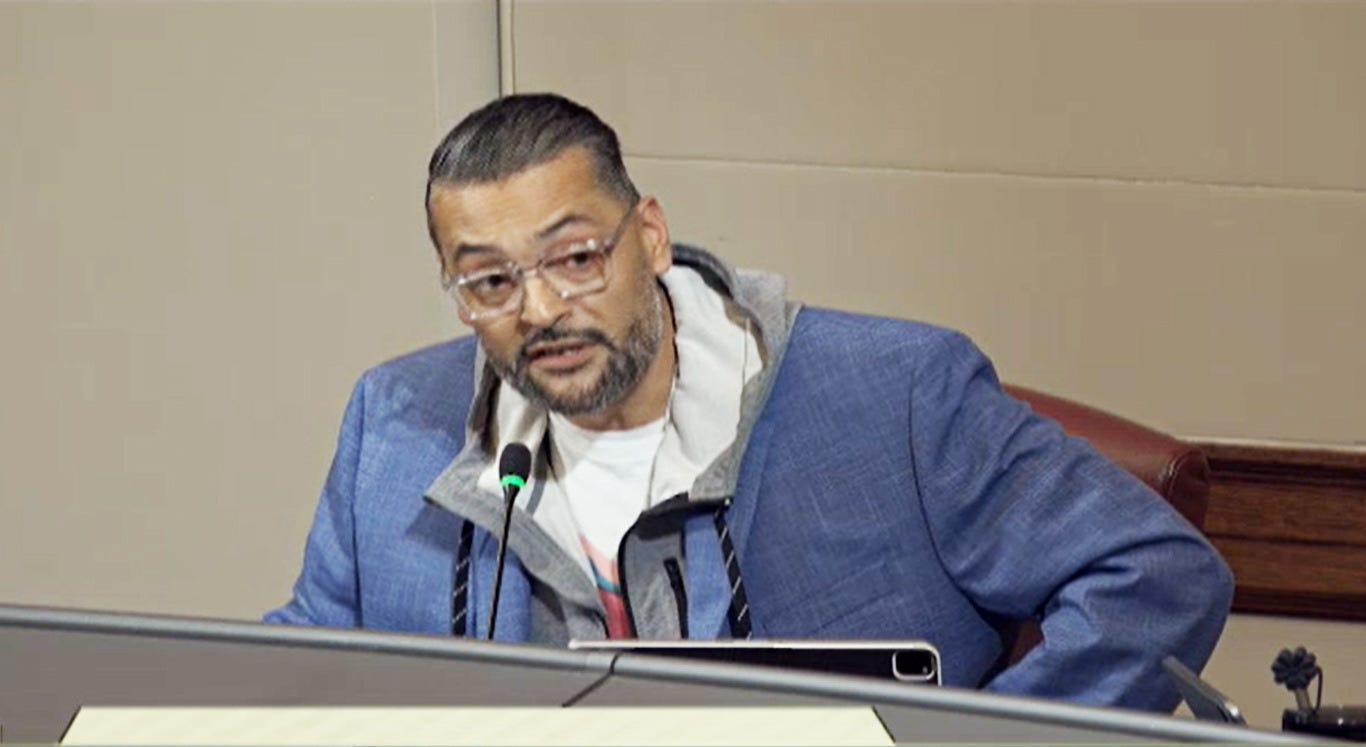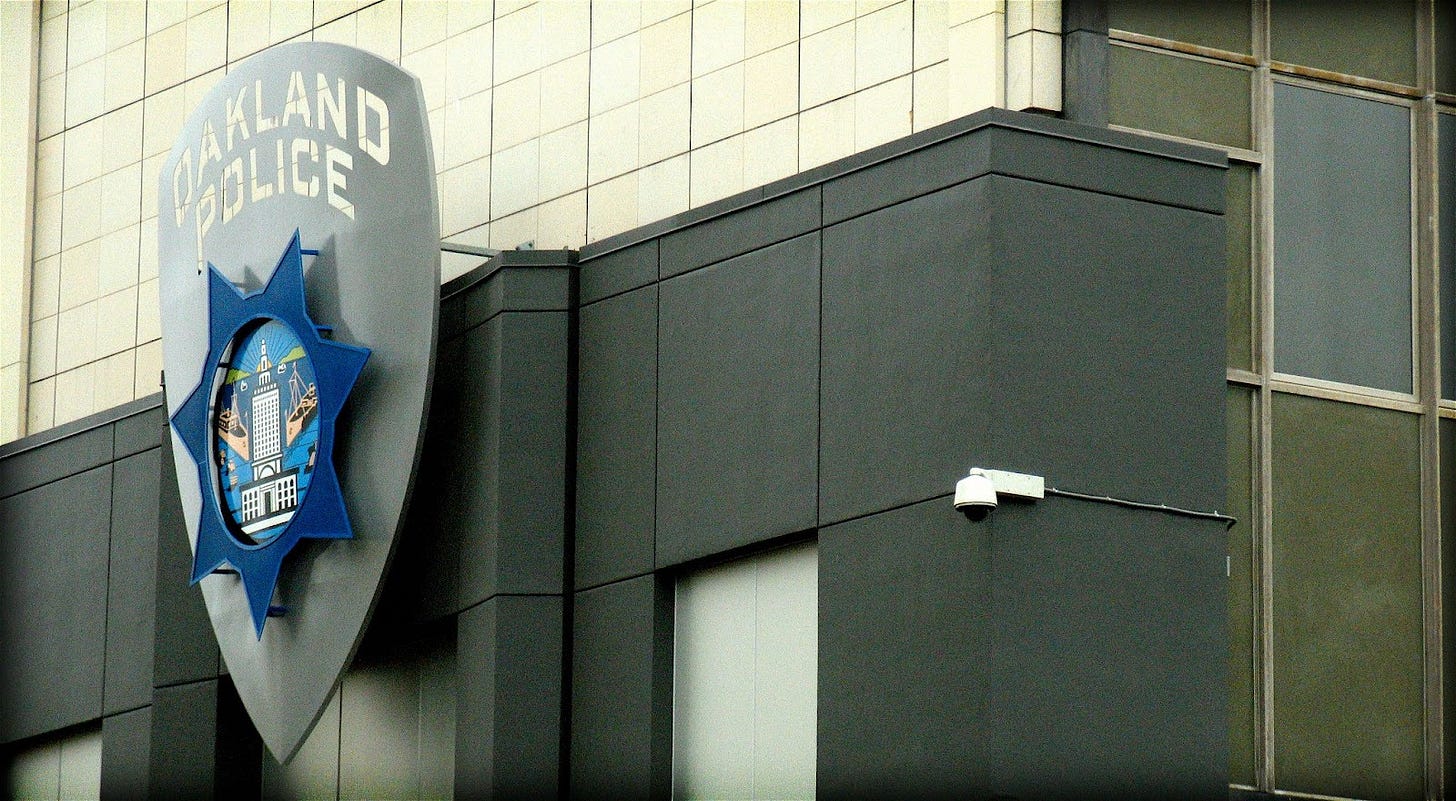Oakland’s police commission - when does oversight become obstruction?
Oakland’s tangled web of citizen commissions causes delays, duplicated efforts and dysfunction - Part 1

Oakland Report is taking a closer look at the City of Oakland’s many appointed citizen commissions, starting with those related to public safety.
Oakland’s revolving door of police chiefs
Oakland has had ten police chiefs over the past ten years. The city’s ability to retain its police chiefs is significantly lower than the average tenure of seven years that police chiefs typically serve.1
Current police chief Floyd Mitchell announced his resignation last month after 18 months on the job amid political tension with Oakland’s police commission and other police oversight bodies. Mitchell’s resignation is yet another churn in a years-running turnover of police chiefs.
Accountability and transparency to the public are hallmarks of good policing. However, Oakland’s uniquely complex and demanding oversight system has significantly weakened the police chief’s authority and control over the police department’s operations, while continuing to assign the lion’s share of responsibility for operational failures to the chief. This arrangement makes the job of Oakland’s top cop one of the most difficult, and arguably most futile, in the nation.2
A multitude of bosses
Oakland’s police chief is overseen by and often must defer decision-making to multiple overlapping oversight entities — more than any other comparable city. This complicated web of control affects the police chief’s decision-making in a wide range of operational areas, including equipment and technology procurement, staffing, and pursuit policies.

Oakland’s oversight challenges also appear to have impacted morale in the police department’s rank-and-file. The department currently has only 518 active officers, plus 118 officers on medical or administrative leave.3 The number of officers on leave is exceptionally high, and many are on administrative leave pending investigations triggered by the NSA4 and oversight body requirements. This level of police staffing also falls far below the city’s promise to Oakland voters and taxpayers to maintain a minimum police staffing level of 700 officers.
And there are few signs that the level of police staffing will increase any time soon. According to recent exit surveys, Oakland continues to lose five to six police officers per month, with officers citing commutes, “heavy discipline” and ongoing federal oversight as leading factors in their decisions to leave the organization.5

Citizen oversight bodies now have unprecedented power
Oakland Police Department (OPD) is one of the most heavily regulated police departments in the nation. A series of oversight reforms put in place over the past ten years have resulted in an unprecedented, uniquely powerful police oversight system.
In addition to being a municipal department reporting up to the mayor, city council, and city administrator, OPD also has been under federal monitoring for over 20 years. OPD also is subject to multiple citizen oversight bodies whose powers are far more extensive than in most cities. They include:
Oakland Public Safety Policy and Oversight Commission (OPSPOC)
Community Policing Advisory Board (this board is focused on community engagement with police such as neighborhood watch and has no direct oversight power)
Within the Police Commission there are two additional bodies with powers over the police:

Together, these layers of oversight form a structure that grants extraordinary authority to volunteer citizen appointees that is typically reserved for elected officials and high-level government executives.
For example, Oakland is the only major U.S. city that currently has a charter-established citizen oversight board with the authority to fire the police chief, in addition to having wide-ranging disciplinary, investigative, and audit authority over the police department.6
That power was tested in February 2020 when the Oakland Police Commission, after “long-simmering tension” voted to terminate police chief Anne Kirkpatrick without cause, citing a loss of confidence in her leadership.7 (Then-mayor Libby Schaaf quickly approved the termination.) In response, Kirkpatrick brought a federal whistleblower retaliation lawsuit against the City of Oakland, and in 2022 she won a $1.5 million settlement.8

Law enforcement expertise is screened out
Appointments to Oakland’s oversight commissions are made through various selection models, including mayoral and city council appointments and in some cases, citizen selection panels. While the intent is to distribute influence and foster inclusion of different perspectives on the commissions, some of the commissions explicitly screen out one perspective: law enforcement expertise.
Take for example the police commission and its selection panel. Both of these bodies explicitly bar current or former police officers or employees of law-enforcement unions from serving.9 The stated intent of this restriction is to prevent conflicts of interest. But some observers have noted that screening out former or retired law enforcement experts filters out valuable technical expertise, and suggests an inherent bias against people whose perspectives may include deeper understanding of or even support for law enforcement.
Several appointees to the city’s police oversight bodies appear to lack relevant law enforcement or procedural experience and as a result frequently spend extended periods of time seeking background context before substantive discussion can begin.
This dynamic routinely turns commission meetings into multi-hour sessions of procedural education, followed by repeated demands for additional documentation or reports that can significantly delay or even derail progress toward stated goals.
Citizen commissions lack centralized accountability and remedies are slow
The tone of the interactions in oversight meetings has for years become increasingly adversarial. The result is often policy gridlock, and a police department that is unable to deliver on key aspects of its public safety mandate due to complex and restrictive oversight, yet that also bears the brunt of blame for under-performing expectations. This cycle of control, failure, recrimination, and more control raises questions about the oversight system’s effectiveness at balancing public safety needs with police accountability, public safety effectiveness, and ethical governance.
Oakland’s citizen commissions often operate with scant direct oversight of their activities. No single entity monitors the performance, ethics, or effectiveness of the oversight bodies. As a result, many commissions function in relative isolation, with limited coordination or feedback from the city officials who appointed them or the city staff who must execute their directives. This absence of a centralized accountability framework means that even when commissions overstep their mandates or stall critical decisions, the remedies can be slow, fragmented, and often ineffective.
The city council on October 21 declined to reappoint the current chairperson of the police commission, with some council members citing concerns about the commission’s selection process and others a lack of public confidence in the commission’s work.10
Regardless of one’s views on law enforcement policies and practices, Oaklanders are entitled to have a government that operates efficiently, led by people with skills, experience and training in the matters they oversee, with decisions made in a transparent, ethical and reasonably expeditious manner that takes into account the overall needs of the public it serves. The present system of overlapping, redundant, and in some cases, counterproductive oversight appears not to contribute to these aspects of good governance.
Part 2 in this series on city commissions will review the privacy advisory commission.

If you like our work, please consider donating. We are a volunteer-run, 501(c)(3) charitable nonprofit organization based in beautiful Oakland, California.
Our mission is to make truth more accessible to all Oakland residents through deep investigative reporting and evidence-based analysis of local issues.
Your donation of any amount helps us continue our work to produce articles like this one.
Thank you.
Police Chiefs Compensation and Career Pathways: PERF’s 2021 Survey. Police Executive Research Forum, 2022. https://www.policeforum.org/assets/ChiefsCompensation.pdf
Hollyfield, Amy. “Oakland City Councilmember reacts to Police Chief Anne Kirkpatrick’s firing.” ABC 7 News, February 21, 2020. https://abc7news.com/post/oakland-city-councilmember-reacts-to-police-chief-firing/5956010/
City of Oakland, Regular Meeting of the Police Commission. “Meeting Agenda, October 23, 2025.” Oakland Police Department Reporting Template For Police Commission Meeting. City of Oakland, California, October 23, 2025, p. 21, item VI, Attachment 2. https://www.oaklandca.gov/files/assets/city/v/1/police-commission/regular-meeting-agendas/opc-regular-meeting-agenda10_23_25.5.fin.3-pdf.pdf#page=21
The Negotiated Settlement Agreement (NSA) is a federal court-mandated reform process for the Oakland Police Department (OPD) that began in 2003 due to misconduct allegations. It requires OPD to implement dozens of reforms in areas like internal affairs, use of force, and community policing. The NSA also placed OPD under the direct supervision of a federal monitor and a federal district judge who together were and still are empowered to determine the department’s compliance with the reform tasks.
City of Oakland, Special Meeting of the City Council Public Safety Committee. “Meeting Agenda, July 22, 2025.” OPD Biannual Staffing Report, July 9, 2025. City of Oakland, California, July 22, 2025, item 5. https://oakland.legistar.com/View.ashx?M=F&ID=14495269&GUID=1C2116EA-6A77-4362-9AD1-7E8EDF692A4F
Lenthang, Marlene. “Police oversight boards are proliferating, but do they actually work?” ABC News, June 4, 2021. https://abcnews.go.com/US/police-oversight-boards-proliferating-work/story?id=77919091
Cassidy, Megan and Sarah Ravani. “Oakland Police Commission fires Police Chief Anne Kirkpatrick.” San Francisco Chronicle, Feb 21, 2020. https://www.sfchronicle.com/bayarea/article/Oakland-Police-Commission-considers-firing-Police-15072601.php
Bay City News Service. “Jury finds former Oakland Police Chief Anne Kirkpatrick was fired in retaliation.” CBS News, May 27, 2022. https://www.cbsnews.com/sanfrancisco/news/anne-kirkpatrick-former-oakland-police-chief-fired-retaliation-jury-finds/
City of Oakland, California. Charter of the City of Oakland, Article 6, Section 604(c). https://library.municode.com/ca/oakland/codes/code_of_ordinances?nodeId=THCHOA_ARTVIADOR
City of Oakland, Concurrent Meeting of the Oakland Redevelopment Successor Agency and the City Council. “Meeting Minutes, October 21, 2025.” Adopt A Resolution Accepting The Police Commission Selection Panel’s Slate Of Two Commissioners, Ricardo Garcia-Acosta And Omar Farmer, To Serve On The Oakland Police Commission. City of Oakland, California, October 21, 2025, p. 14, item S8. https://oakland.legistar.com/View.ashx?M=M&ID=1339687&GUID=B3A274AA-C1C8-42C6-807C-31D17DF606A7



I liked your article about the multiple citizens commissions overseeing the police department. No wonder we can't keep police chiefs or officers with this kind of interference. What can the city council do about this mess? What about a charter amendment to get rid of the police commission and put responsibity for the police dept. with the mayor and city council where it belongs?
This is one of the better, most cohesive articles written, regarding why and exactly how the failure of OPD goes on year-after with not a glimmer of hope in sight for ever resolving the myriad of dysfunctions that continue unabated?